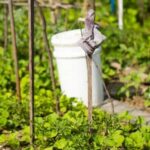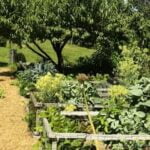Cedar chips have long been a popular choice for gardeners looking to add a touch of natural beauty to their landscaping. However, there is an ongoing debate about whether cedar chips are harmful to vegetable gardens. The question “are cedar chips harmful to vegetable gardens” is one that many gardeners grapple with when considering their mulching options.
Cedar chips are favored by many gardeners for their aromatic scent, natural insect-repelling properties, and ability to break down slowly in the soil. These benefits make them a desirable choice for mulching in vegetable gardens. Additionally, cedar chips can help suppress weeds, regulate soil temperature, and retain moisture, all of which contribute to healthier plants.
Despite the advantages of using cedar chips in vegetable gardens, there are potential drawbacks to consider. One concern is the impact that cedar chips may have on soil pH levels. Additionally, some gardeners worry that cedar chips could inhibit plant growth or health due to allelopathic properties. It is essential to weigh these potential risks against the benefits before deciding whether to use cedar chips in your vegetable garden.
Benefits of Using Cedar Chips in Vegetable Gardens
Cedar chips are a popular choice for mulching in vegetable gardens due to their numerous benefits. One of the primary advantages of using cedar chips is their natural resistance to pests and decay. This can help protect vegetable plants from potential threats, keeping the garden healthier in the long run. Additionally, cedar chips have a pleasant aroma that can enhance the overall ambiance of the garden space.
Another benefit of using cedar chips in vegetable gardens is their ability to improve soil structure over time. As cedar chips break down, they can contribute organic matter to the soil, enriching it with essential nutrients and promoting better drainage. This can create a more conducive environment for plant roots to thrive and establish strong growth.
Furthermore, cedar chips act as a natural weed deterrent when used as mulch in vegetable gardens. The dense nature of cedar chips helps smother weed growth by blocking sunlight from reaching the soil surface, reducing the need for manual weeding. This not only saves time and effort but also helps maintain a cleaner and tidier garden appearance.
| Benefit | Description |
|---|---|
| Pest Resistance | Cedar chips naturally repel pests, protecting vegetable plants |
| Soil Improvement | Cedar chips enrich soil with nutrients and promote better drainage |
| Weed Deterrent | The dense nature of cedar chips helps prevent weed growth in vegetable gardens |
Potential Drawbacks of Using Cedar Chips in Vegetable Gardens
While cedar chips offer numerous benefits to vegetable gardens, it is essential to consider potential drawbacks before incorporating them into your gardening routine. One concern that gardeners often have is whether cedar chips can be harmful to soil pH. Cedar chips tend to be acidic, which could lower the pH of the soil over time. This may not be ideal for all types of vegetables, especially those that prefer a more neutral or alkaline soil environment.
Another drawback of using cedar chips in vegetable gardens is their slow decomposition rate. While this means they can provide long-lasting weed control and moisture retention benefits, it also means that they do not contribute significantly to improving soil structure and fertility as quickly as other types of organic mulches might. Additionally, if you need to amend or till your soil frequently, the presence of cedar chips can make these tasks more challenging.
Furthermore, some gardeners have reported issues with cedar allergies when working with cedar-based products like cedar chips. If you are sensitive to certain types of wood or have known allergies, using cedar chips in your vegetable garden may cause discomfort or adverse reactions. It is essential to wear protective gear such as gloves and masks when handling cedar products to reduce the risk of any allergic reactions.
| Concern | Impact |
|---|---|
| Soil pH | Potentially lower the pH over time |
| Decomposition Rate | Slow decomposition might hinder soil improvement |
| Allergic Reactions | Possible discomfort or adverse reactions for individuals sensitive to cedar |
Are Cedar Chips Harmful to Soil pH in Vegetable Gardens?
Cedar chips have gained popularity in gardening due to their natural and aromatic properties that deter pests and add a decorative touch to landscapes. However, when it comes to vegetable gardens, many gardeners raise concerns about whether cedar chips are harmful to soil pH. The acidity of cedar chips can indeed affect the soil pH over time, potentially impacting the growth and health of your vegetable plants.
While cedar chips may initially have little effect on soil pH, as they break down, they release natural oils and acids that can gradually lower the pH levels. This acidic environment may not be suitable for all vegetables, especially those that prefer neutral or slightly alkaline soils. It is essential to monitor the pH levels regularly if you choose to use cedar chips as mulch in your vegetable garden.
To mitigate the potential negative impacts on soil pH from using cedar chips, you can take several precautions. One approach is to mix compost or other organic matter into the soil before applying cedar chips as mulch.
This can help buffer any changes in pH caused by the decomposition of the cedar chips. Additionally, rotating your crops and testing the soil regularly for pH levels can help you maintain a healthy growing environment for your vegetables while still enjoying the benefits of cedar chip mulch.
Impact of Cedar Chips on Plant Growth and Health
Cedar chips are a popular choice for mulching in vegetable gardens due to their natural insect-repellent properties, pleasant aroma, and ability to effectively suppress weeds. However, gardeners may wonder about the impact of cedar chips on the growth and health of their plants.
Effects on Soil Health
One concern that often arises when using cedar chips in vegetable gardens is their potential impact on soil pH. Cedar chips have a high concentration of tannins, which can affect the acidity levels in the soil over time.
This can be beneficial for acid-loving plants like blueberries or azaleas but may not be ideal for vegetables that prefer neutral pH levels. It is important to regularly monitor the soil pH when using cedar chips as mulch and adjust accordingly to ensure optimal growing conditions for your vegetables.
Root Development and Nutrient Absorption
While cedar chips can help retain moisture in the soil and regulate temperature, they may also hinder root development and nutrient absorption in some vegetable plants. The decomposition process of cedar chips can deplete nitrogen levels in the soil temporarily, which may impact the growth of nitrogen-sensitive vegetables like tomatoes or corn. To mitigate this issue, consider supplementing with additional nitrogen-rich fertilizer or incorporating other organic materials into the soil to maintain nutrient balance.
Potential Plant Stress
In some cases, cedar chips used as mulch in vegetable gardens can inadvertently cause stress to certain plant species. Plants that are sensitive to changes in moisture levels or require well-draining soil may suffer from excessive moisture retention caused by cedar chip mulch.
Additionally, cedar oils released during decomposition could potentially inhibit seed germination or affect young seedlings negatively. It is essential to observe how your plants respond to cedar chip mulch and make adjustments as needed to promote healthy growth and vigor in your vegetable garden.
Can Cedar Chips Attract Pests to Vegetable Gardens?
Many gardeners often wonder whether cedar chips are harmful to their vegetable gardens due to the potential pests they may attract. While cedar chips are known for their natural insect-repelling properties, some gardeners have expressed concerns about the possibility of attracting pests to their precious crops. Let’s explore this topic further to determine if cedar chips can indeed bring unwanted visitors to your vegetable garden.
Benefits of Cedar Chips in Repelling Pests
One of the main advantages of using cedar chips in vegetable gardens is their ability to deter certain pests naturally. Cedar wood contains natural oils and compounds that repel insects such as ants, moths, and even termites. This can be especially beneficial for organic gardening practices where chemical pesticides are avoided. The aromatic scent of cedar also acts as a deterrent for many insects, making it a popular choice for gardeners looking for a more eco-friendly pest control solution.
Potential Risks of Attracting Pests
Despite their repellent properties, there is still a possibility that cedar chips could attract certain pests to your vegetable garden. For example, rodents like mice and squirrels may be drawn to the attractive scent of cedar and use the mulch as nesting material.
Additionally, certain insects may not be affected by cedar’s aroma and could potentially make a home in the moist environment created by the mulch. It is essential for gardeners to weigh the benefits against these potential risks before deciding whether or not to use cedar chips in their vegetable gardens.
Tips for Safely Using Cedar Chips in Vegetable Gardens
Cedar chips are a popular choice for mulching vegetable gardens due to their aromatic properties, natural appearance, and ability to deter pests. However, when using cedar chips in your garden, it is important to follow some tips to ensure they are being used safely and effectively.
To safely use cedar chips in your vegetable garden, consider the following tips:
- Choose untreated cedar chips: Opt for untreated cedar chips to avoid any harmful chemicals that may affect your soil or plants.
- Avoid direct contact with plant stems: When applying cedar chips as a mulch, make sure to leave space around the stems of your plants to prevent potential rot or moisture-related issues.
- Monitor soil pH levels: Regularly test the pH of your soil when using cedar chips as an ongoing mulching material. Cedar chips have the potential to slightly acidify the soil over time, so adjustments may be necessary depending on your plant’s needs.
While cedar chips can offer many benefits for vegetable gardens, it is essential to understand how to use them properly to avoid any negative consequences. By following these tips, you can enjoy the advantages of cedar chips while minimizing any potential risks that may arise from their use.
Alternative Mulch Options for Vegetable Gardens
Cedar chips are a popular choice for gardeners looking to mulch their vegetable gardens, but they may not be the best option for everyone. While cedar chips offer several benefits, such as natural pest repellent properties and a pleasant aroma, there are some potential drawbacks to consider. If you are wondering, “Are cedar chips harmful to vegetable gardens?” it is important to weigh the pros and cons before making a decision.
To help you explore alternative mulch options for your vegetable garden, here are some alternatives to cedar chips that you may want to consider:
- Straw: Straw is a cost-effective and readily available mulch option that can help retain moisture in the soil and suppress weed growth.
- Grass Clippings: Grass clippings can be used as mulch in vegetable gardens to add nutrients back into the soil as they break down.
- Compost: Compost is a natural and nutrient-rich mulch option that can improve soil health and provide essential nutrients to your plants.
While cedar chips can impact soil pH levels due to their natural acidity, these alternative mulch options can help maintain a healthy balance in your vegetable garden. It is essential to consider factors like moisture retention, weed suppression, and nutrient availability when choosing the right mulch for your garden. By exploring different options, you can find the best fit for your specific gardening needs while avoiding any potential harm from cedar chips.
Conclusion
In conclusion, the use of cedar chips in vegetable gardens can provide numerous benefits but also comes with potential drawbacks that gardeners should be aware of. While cedar chips can help retain moisture, deter pests, and add an attractive aesthetic to the garden, there is a concern about their impact on soil pH and plant growth.
However, when used properly and in moderation, cedar chips can be a safe and effective mulch option for vegetable gardens. It is essential to monitor the soil pH regularly and adjust as necessary to ensure optimal conditions for plant growth. Additionally, using a combination of mulch materials or rotating them throughout the season can help mitigate any negative effects from cedar chips.
To minimize the risks associated with cedar chips, it is recommended to follow best practices such as using them sparingly, avoiding direct contact with plant stems, and incorporating other organic materials into the garden bed. By being mindful of these tips and closely monitoring the garden’s health, gardeners can enjoy the benefits of cedar chips while minimizing any potential harm to their vegetable gardens.
Frequently Asked Questions
Can You Use Cedar Chips in a Vegetable Garden?
Cedar chips can be used in a vegetable garden as a mulch to help suppress weeds, retain moisture, and add organic matter to the soil as they decompose. However, cedar can also affect soil pH, so it’s important to monitor your garden’s needs.
Can You Put Cedar Chips Around Tomato Plants?
Using cedar chips around tomato plants can be beneficial as they help to deter pests such as slugs and other insects that may harm the plants. The aromatic oils in cedar can act as a natural repellent while still serving the purpose of mulch for moisture retention.
Are There Any Wood Chips That Are Bad for Gardens?
Certain wood chips like those from black walnut trees contain natural chemicals that can inhibit plant growth or negatively impact soil health in gardens. It’s best to avoid using these types of wood chips in areas where you want healthy and productive plant growth.

If you’re looking to get into vegetable gardening, or are just looking for some tips on how to make your current garden better, then you’ve come to the right place! My name is Ethel and I have been gardening for years. In this blog, I’m going to share with you some of my best tips on how to create a successful vegetable garden.





